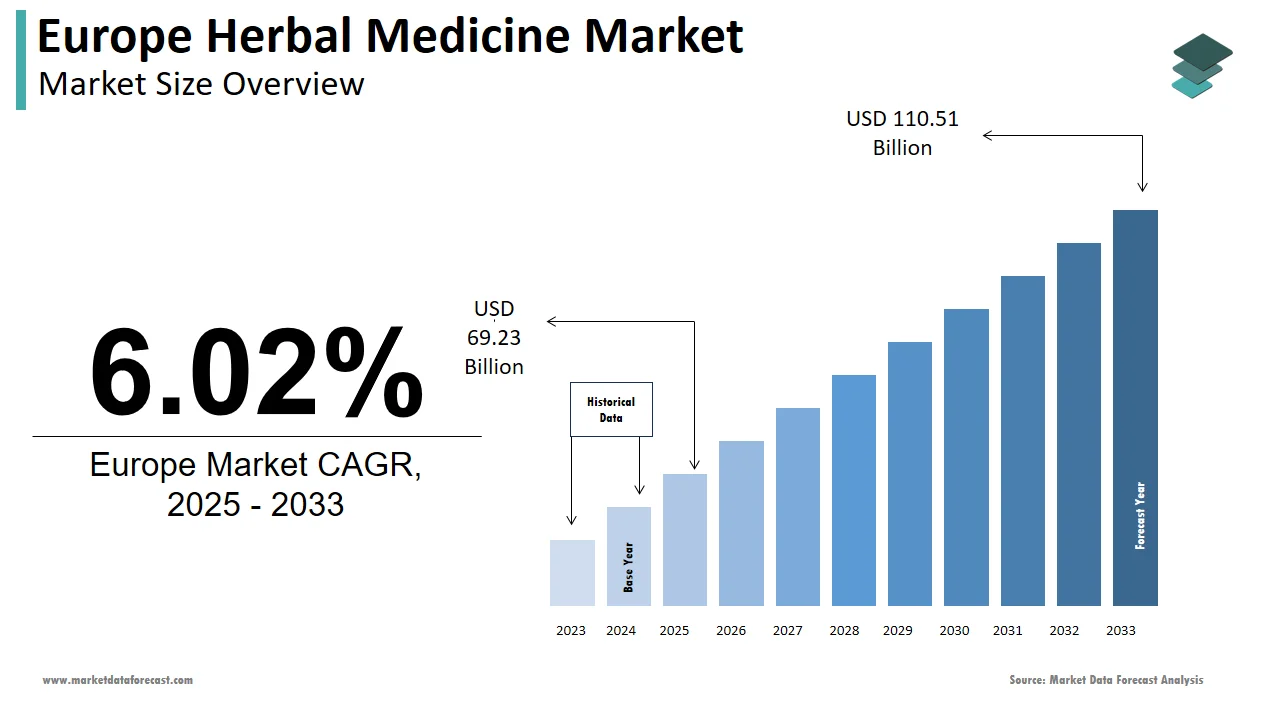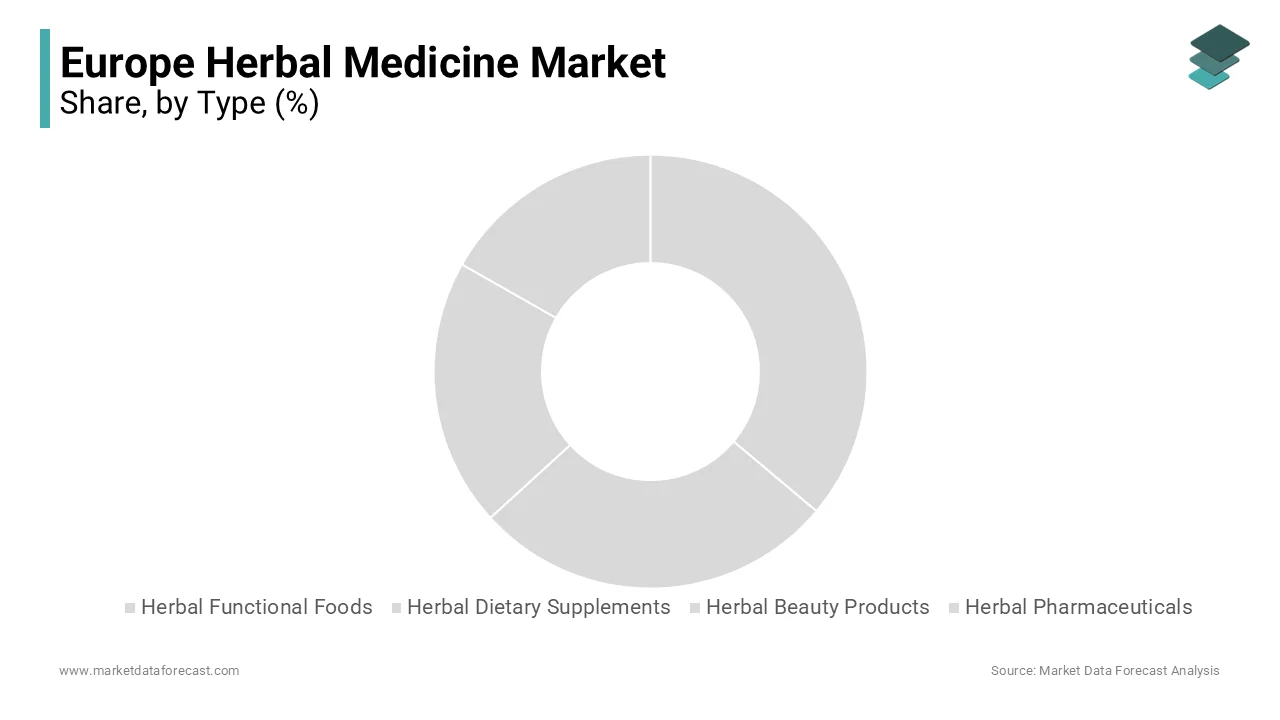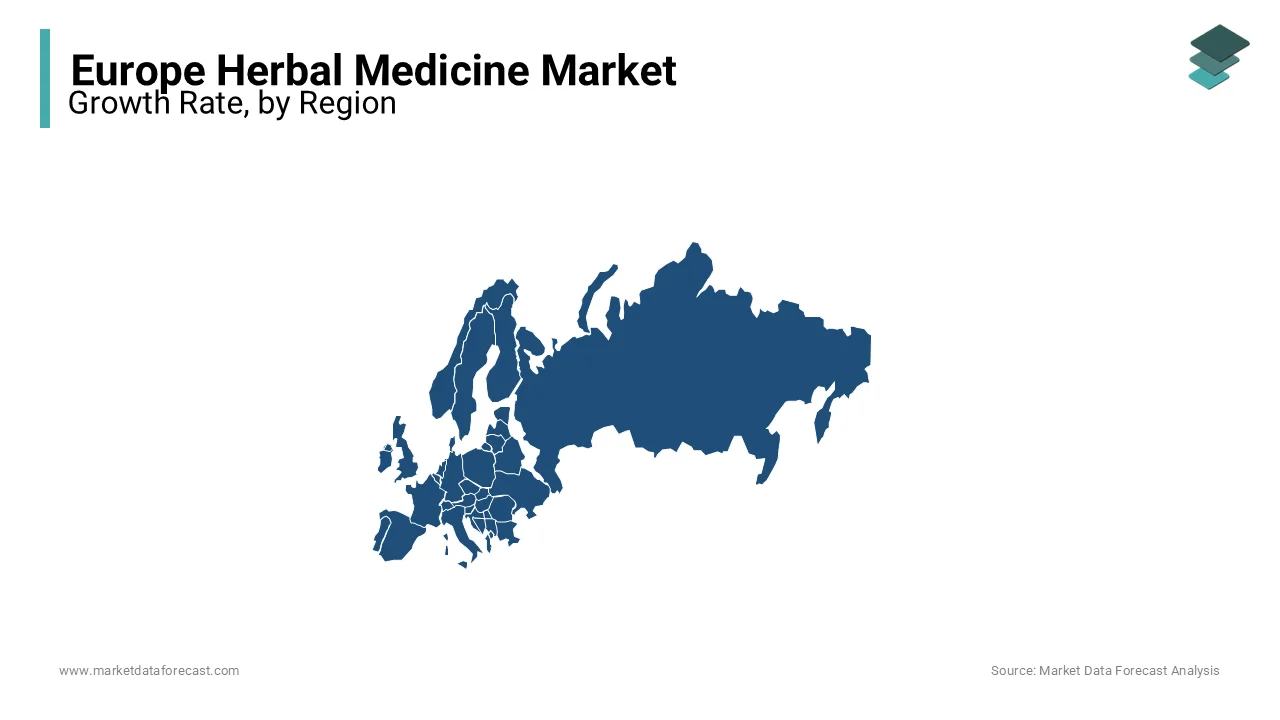Europe Herbal Medicine Market Size, Share, Trends & Growth Forecast Report By Type, Source and Country (Germany, UK, France, Italy, Rest of Europe) – Industry Analysis From 2025 to 2033.
Europe Herbal Medicine Market Size
The herbal medicine market size in Europe was valued at USD 65.3 billion in 2024. The European market is estimated to be worth USD 110.51 billion by 2033 from USD 69.23 billion in 2025, growing at a CAGR of 6.02% from 2025 to 2033.
MARKET DRIVERS
Chronic Diseases and Aging Population Drive Growth
The growing inclination towards natural products and the growing senior population in developed countries such as Germany, the UK, and Spain is primarily driving the growth of the Europe herbal medicine market. Also, the proliferation of chronic diseases across Europe and awareness among the people are expected to drive market growth. Besides, the increasing concerns such as nutritional deficiency and related diseases lead to the herbal medicine market opportunities. The herbal counterpart of these unhealthy nutrients provides consumers with the required nutrition, which is expected to fuel the herbal medicine market in the European region. Herbal drugs are derived from plants and natural resources and have disease-curable benefits with no side effects; this advantageous feature is expected to favor the development of this regional market during the forecast period. The increase in health and well-improving healthcare facilities and government incentives and investments contribute to the development of the herbal medicine market.
Other factors such as marginal side effects, supplier advances, and the FDA's adoption of Current Good Manufacturing Practices (CGMP) for dietary supplements are expected to drive the European herbal medicine market growth. The herbal beauty products segment is expected to expand rapidly during the forecast period, owing primarily to a rise in beauty sales revenue. High disposable income and the availability of a diverse commodity range are driving up market growth. European regulations are expected in the coming years, which will expand marketing prospects for natural goods. In particular, the European Community's implementation of two directives within the defined time frame would substantially affect the market.
MARKET RESTRAINTS
Fragmented Market and Misuse of Herbal Remedies Restrain Growth
The situation in the European market for herbal and natural products is complicated because the market is wide and fragmented, and it includes natural products whether they come under food or medicinal regulation. While herbals and plant extracts are the most common product types, there are many other natural ingredients found in foods and medicines, such as fish oils, vitamins, and minerals. The regulatory authorities' lack of interest and focus limits market expansion. Furthermore, a lack of understanding among people in emerging markets impedes market development. However, Incorrect use of herbal remedies can result in adverse side effects on the body, which is one of the market's restraint factors.
REPORT COVERAGE
|
REPORT METRIC |
DETAILS |
|
Market Size Available |
2024 to 2033 |
|
Base Year |
2024 |
|
Forecast Period |
2025 to 2033 |
|
Segments Covered |
By Type, Source, Form, and Region. |
|
Various Analyses Covered |
Global, Regional and Country-Level Analysis, Segment-Level Analysis, Drivers, Restraints, Opportunities, Challenges; PESTLE Analysis; Porter’s Five Forces Analysis, Competitive Landscape, Analyst Overview of Investment Opportunities |
|
Countries Covered |
UK, France, Spain, Germany, Italy, Russia, Sweden, Denmark, Switzerland, Netherlands, Turkey, Czech Republic, and the Rest of Europe. |
|
Market Leaders Profiled |
TSUMURA & CO., Dr. Willmar Schwabe India Pvt. Ltd., Blackmores Limited, NATURE’S ANSWER, Arkopharma, Arizona Natural Products, Bio-Botanica Inc., Herbal Africa, Sidomuncul, and Nature Herbs. |
SEGMENTAL ANALYSIS
By Type INsights
COUNTRY LEVEL ANALYSIS
Regionally, the European herbal medicine market is expected to account for a substantial share of the global market during the forecast period due to the increasing consumer demand for natural supplements and the aging population. However, new product launches of new natural health products in Europe will improve the market growth. Moreover, European customers are now open to experimenting with complementary and herbal drugs, driving up demand for natural ingredients. The current European regulatory situation in herbal and natural goods is marked by a significant disparity between stringent regulators such as Germany and relaxed countries like the United Kingdom. Non-EU companies find it almost difficult to sell their herbal and natural goods in an EU country due to complex regulations.
The German herbal medicine market is projected to dominate the European market during the forecast period.
The market is anticipated to contribute to the European regional market in the coming years. However, the market growth is led by factors such as the rising prevalence of chronic diseases and growing awareness regarding preventive healthcare. Due to increased visibility, rising use of mobile phones and the internet, vast coverage areas, and offering goods at lower prices, the e-commerce delivery channel segment will produce higher revenues by 2028. Furthermore, the herbal pharmaceuticals segment accounted for a significant share of the overall market in 2024.
The UK herbal medicine market is expected to grow at the fastest CAGR during the forecast period.
Developed healthcare infrastructure, growing healthcare spending, and growing geriatric population influence the country's market growth. Furthermore, recent technical advances and an expansion in R&D spending in the healthcare sector generate lucrative opportunities for key market participants, through which market expansion can be possible.
KEY MARKET PARTICIPANTS
Some of the prominent companies operating in the European herbal medicine market profiled in this report are TSUMURA & CO., Dr. Willmar Schwabe India Pvt. Ltd., Blackmores Limited, NATURE’S ANSWER, Arkopharma, Arizona Natural Products, Bio-Botanica Inc., Herbal Africa, Sidomuncul, and Nature Herbs.
MARKET SEGMENTATION
This Europe herbal medicine market research report is segmented and sub-segmented into the following categories.
By Type
- Herbal Functional Foods
- Herbal Dietary Supplements
- Herbal Beauty Products
- Herbal Pharmaceuticals
By Source
- Roots and barks
- Fruits
- Whole plants
- Leaves
- Others
By Form
- Tablets
- Capsules
- Extracts
- Syrups
- Powders
- Others
By Country
- UK
- France
- Spain
- Germany
- Italy
- Russia
- Sweden
- Denmark
- Switzerland
- Netherlands
- Turkey
- Czech Republic
- Rest of Europe
Related Reports
Access the study in MULTIPLE FORMATS
Purchase options starting from $ 2000
Didn’t find what you’re looking for?
TALK TO OUR ANALYST TEAM
Need something within your budget?
NO WORRIES! WE GOT YOU COVERED!
Call us on: +1 888 702 9696 (U.S Toll Free)
Write to us: [email protected]



